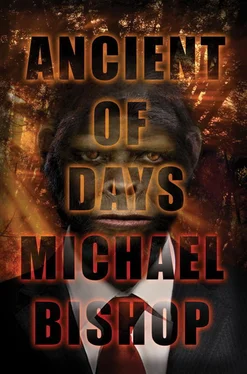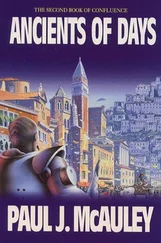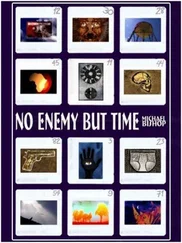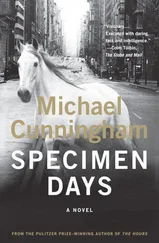“Davie Hutton’s never around when you need him, is he?” Craig Puddicombe had trained his shotgun on RuthClaire, Adam, and me. “Only pops up when you’ve run a stop sign or laid down rubber in the A&P parking lot.”
E. L. Teavers chuckled coldly, and I stared harder at the Klansman in jogging shoes. Was that Davie Hutton? I could not really tell. His possession of handcuffs and his refusal to speak made me suspect that it was. It also helped to explain the blatancy with which the Zealous High Zygote’s cohorts on Main Street had assaulted the West Bank and then made good their getaway. If Davie was with them, then they’d had a free hand. Unfortunately, or maybe fortunately, Davie had never seemed quite so pale and etiolated as this apparition.
“Time to go,” E(lvis) L(amar) Teavers said.
“Where?” RuthClaire asked.
But now that Zubowicz and Nollinger were secured, the urge to banter with or taunt us deserted the intruders. Grimly unspeaking, they herded us out the back door, past the restroom, and through the grass-grown alley to a small dewy hillock from which Beulah Fork’s water tower rose into the summer darkness like a war machine out of H. G. Wells. Adam stared up into the tower’s crisscrossing support rods, but Teavers, sensing that Adam had it in mind to seek refuge aloft, cracked him across the temple with his shotgun barrel.
“Go on, you goddamn hibber!” he cried. “No hibberish monkey business!”
As Nollinger had done in the restaurant, Adam fell to his knees. His lips curled back to reveal his canines. RuthClaire knelt beside him to whisper consolation. Although Adam wobbled a little after regaining his feet, he was soon striding as assuredly as any of us, and our bizarre little party passed from the water tower’s low hillock into an asphalt-patched street parallel to Main.
From this street we marched into the upper reaches of the playground of the Beulah Fork Elementary School. Crickets were whirring enthusiastically, but otherwise the town seemed uninhabited, a vast sound stage accommodating the silhouettes of a few isolated Victorian houses along with hundreds of cardboard-cutout elm and magnolia trees. The playground itself, on the other hand, was a minefield in the midst of these innocuous props. Crossing it, I kept waiting for Teavers to blow our heads off. It seemed clear to me that he and his purple-capped pals were marching us to fatal appointments, or, at the very least, to a tryst with tar and feathers.
“Is this how you look after the rights of a hardworking white man?” I asked. “Wrecking his business and terrorizing him and his friends?”
“Shut up,” Craig Puddicombe said.
“I mean, when you came in the other night, you were concerned about my rights being violated. Is this how—?”
E. L. Teavers said: “That’s all forfeit, Mr. Loyd. You and your wife are traitors.”
“To what?” RuthClaire asked.
“I said, ‘Shut up!’” Puddicombe said. “We don’t have to explain nothin’ to you!”
“Not now, maybe,” Teavers added, evenly enough.
And then I saw a van parked behind the softball backstop at the northeastern corner of the playground. Two or three robed figures stood beside this vehicle, human carrion birds in the still unsettled dust surrounding it. The cab of a pickup protruded beyond the nose of the van. Its decorated sides the Klanners had obscured with a thick gouache of mud that had long since dried and hardened. As we approached, one robed figure semaphored with both arms, climbed into the van, and eased it along the backstop so that Teavers and Puddicombe could throw back its sliding door and prod their captives inside. Adam and RuthClaire boarded together while I temporized on the threshold, one foot in the dust as an uncertain tie to the reality of Hothlepoya County. These clownish thugs were about to spirit us away to Never-Never Land.
“Get in,” somebody said, not too urgently.
I obeyed, but looked over my shoulder in time to see the man in jogging shoes go dogtrotting off toward a portable classroom behind the school. Puddicombe climbed in after me and banged the van’s sliding door to. RuthClaire, Adam, and I were made to sit on the floor in the center of the vehicle’s passenger section. Around us perched armed members of the Kudzu Klavern, four more people caparisoned in cumbersome purple and redolent of stale sweat. The darkness prevented me from distinguishing the sex of each one, and their shoes—sneakers or penny loafers—were not much help, either. At least one woman had come along: Her high-pitched mocking laughter greeted every underdone bon mot dropped into the deep fry of our fear and confusion.
Now the van was bumping along at good speed.
“Coulda sworn he’d stink,” one of the men said. “I expected dead rat or wet dog, somethin’ foul anyway.”
“Not this one,” Puddicombe replied. “This one wears English Leather or he don’t wear nothin’ at all.”
The woman guffawed. From where I sat, it was impossible to tell to which robed body the guffaw belonged, only that it was nervous and feminine. After a mile or two, though, I arbitrarily assigned it to the penny loafers.
Our van bounded from rut to rut. We did not seem to be on paved highway. Once, our driver sounded his horn. The sour bleating blast of another horn, undoubtedly that of Teavers’s pickup, answered it. We slowed and turned. The penny loafers guffawed, a high-pitched outburst with no apparent antecedent.
“Where are we going?” RuthClaire asked.
No one answered. Adam had his arm linked in mine. Occasionally he looked from side to side as if trying to sort out the pecking order among our captors. I don’t think he was scared. Both RuthClaire and I were near, and with his free hand he absentmindedly groomed my ex, picking tiny knots out of the shingled strands of her hair.
Eventually the van skewed to a stop. Its sliding door popped back like the lid of a capsized jack-in-the-box. Puddicombe, minus his nylon stocking, forced us outside. We stood in the beams of E. L. Teavers’s pickup truck’s headlights, virtually blinded by their moted yellow glare. The van backed away, executed a wild turn on the edge of a trail rut, and vanished into the night with all its robed cargo but Puddicombe.
This frightened me far worse than anything that had happened so far, including even the first burst of brick against glass in the West Bank. RuthClaire, Adam, and I were stranded in the middle of nowhere with the Zealous High Zygote and his chief lieutenant. I looked up. Stars freckled most of the sky, but a migrating coal sack of clouds had begun to eat big chunks of the western heavens. A bottomless abyss opened over my head and under my feet, and the chill of this sensation spookily disoriented me.
The headlights cut off.
From across the weed-choked field, Teavers said, “Bring the hibber here, Craig.”
“Why?” RuthClaire asked. “What do you mean to do?”
I closed my eyes, opened them, and closed them again. When next I peered about, though, the landscape seemed familiar. We stood on Cleve Snyder’s land not far from Paradise Farm, on a piece of isolated acreage that had never been used to grow beans, cotton, corn, or any other crop—not over fifty or sixty years, anyway. Early in the century, a brick kiln had operated here. What was left was a series of red-clay mounds surrounding cistern-like vats that plunged into the earth seemingly without bottom.
Eight years ago, according to the skinnydipper’s horrified playmates, a child from White Cow Creek had fallen into one of the vats. An attempt to locate and raise him had concluded with the absolute frustration of those who had gone down after him in winch-assisted harnesses. Although afterward there had been some community agitation to cap or fill in the pits, Cleve Snyder had offered to build a barbed-wire barricade with warning placards on it, and this offer had quieted the angry uproar. Tonight, glancing about me, I realized that either Snyder had never fulfilled his promise or else the vigilantes of the Kudzu Klavern had undone his efforts to make the place safe. We were in the foothills of a miniature mountain range, far from succor, civilization, or warning signs.
Читать дальше












